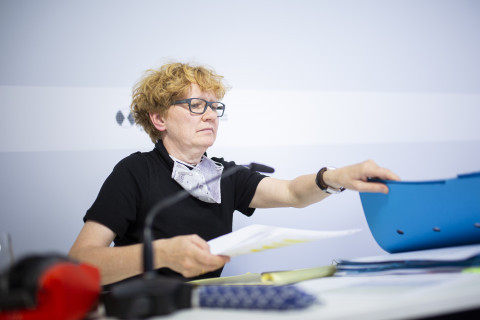
GCED Basic Search Form
Quick Search
현재 위치
뉴스

For the second time this year, over 250 experts, members of civil society and government representatives are meeting around a virtual table to discuss the latest developments in the field of Holocaust education, remembrance and research. Originally planned to be held in Leipzig, the IHRA Leipzig Online Plenary Meetings are taking place over three weeks, from 16 November – 3 December 2020.
Now at the half-way mark, here are some key takeaways from the Working Group, Committee and Project meetings that have been held thus far.
1. Exploring new ways of remembering and learning about the Holocaust
In her welcome address, IHRA Chair Ambassador Michaela Küchler called upon all delegates to embrace the motto “Remembering and working in a digital context.”
With this in mind, many meetings explored innovative digital ways of remembering and learning about the Holocaust. The Education Working Group (EWG) featured presentations on the possibilities of online education methods. Eyal Kaminka of the Israeli delegation showed how Yad Vashem developed MOOCs to engage with students and teachers internationally. Jurmet Huitema-de Waal of the Dutch delegation discussed new ways of sharing Anne Frank’s life story with a younger audience.
Meanwhile, the Museums and Memorials Working Group (MMWG), addressed the impact of the pandemic on Holocaust Memorial Days and underlined the necessity to maintain authentic sites in the center of commemorations. Gilly Carr of the United Kingdom’s delegation explored the digital presence among authentic sites of the Holocaust. With a more robust presence online comes both opportunities as well as challenges, and, in true IHRA spirit, the Working Group also explored ways different institutions from different parts of the world could help support each other’s digital innovation.
2. Sharing information and examples of best practice
The IHRA brings together experts from a variety of disciplines, and institutions of various sizes. All this allows for greater exchange and information-sharing among actors from across the field.
In order to also improve the sharing of information within the IHRA, the Leipzig Online Plenary Meetings featured open sessions to the meetings of the Monitoring Access to Holocaust Collections Project as well as the Safeguarding Sites Project, where they presented their latest findings. Project presentations were also given at the Academic Working Group (AWG) and MMWG meetings, facilitating even greater exchange.
Updates from IHRA Permanent International Partners (PIPs) were also provided in the Committee on Antisemitism and Holocaust Denial. Karel Fracapane of UNESCO and Tome Shekerdjiev of the OSCE Office for Democratic Institutions and Human Rights (OSCE/ODIHR) announced the launch of a series of four curricula developed in partnership with University College London (UCL) which provide guidance on addressing antisemitism and countering prejudice. Henri Nickels from the EU Agency for Fundamental Rights (FRA) provided an overview of data on antisemitism in the EU over the last ten years, exploring the implications for the continued fight against antisemitism.
3. Working with the IHRA's latest working definition
The decision to adopt the working definition of antigypsyism/anti-Roma discrimination on 8 October represented a significant step toward implementing the commitments outlined in the 2020 IHRA Ministerial Declaration. The decision “solidly underlines our pledge to remember the genocide of the Roma,” IHRA Chair Ambassador Küchler stated in her welcome address to delegates.
Now, the Committee on the Genocide of the Roma is focused on discussions concerning how to use the working definition to raise awareness of the issue of antigypsyism/anti-Roma discrimination in Member Countries. Such efforts will include further engagement with grassroots organizations, making sure to continue to involve Roma organizations in this work.
4. Combatting Holocaust distortion
As the pandemic wears on, instances of Holocaust distortion are becoming more common. With this, the importance of being able to identify and adequately respond to Holocaust distortion becomes all the more urgent. The Global Task Force Against Holocaust Distortion is in the final stages of developing recommendations on the topic, which were discussed with the Committee on Antisemitism and Holocaust Denial. These recommendations will help to raise awareness of Holocaust distortion and will provide policymakers with tools to address it.
Holocaust distortion has implications for all fields, including education. IHRA Honorary Chairman Yehuda Bauer paid a visit to the EWG for a lecture on the topic and how educators have a special responsibility to safeguard the record of the Holocaust.
Carrying on the work begun at the Berlin Virtual Plenary with the adoption of the IHRA Statement on Rehabilitation, the Committee on Antisemitism and Holocaust Denial delved deep into the topic of rehabilitation as well.
Want to know what the IHRA's delegates will be up to for the next week of Leipzig Online Plenary Meetings? Learn more at #IHRAfromLeipzig and follow the IHRA on social media @TheIHRA.
URL:
https://www.holocaustremembrance.com/news-archive/ihra-leipzig-online-plenary-meetings-underway
